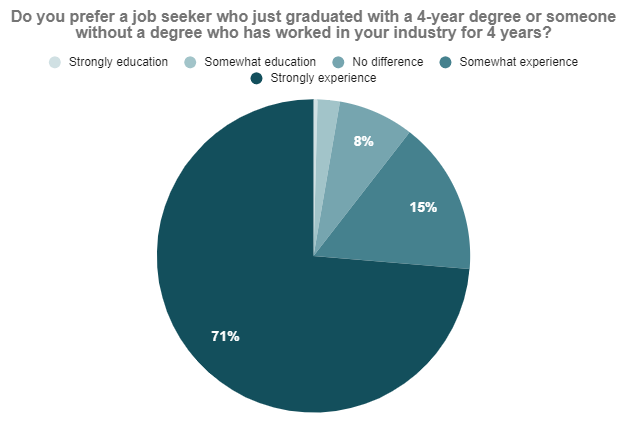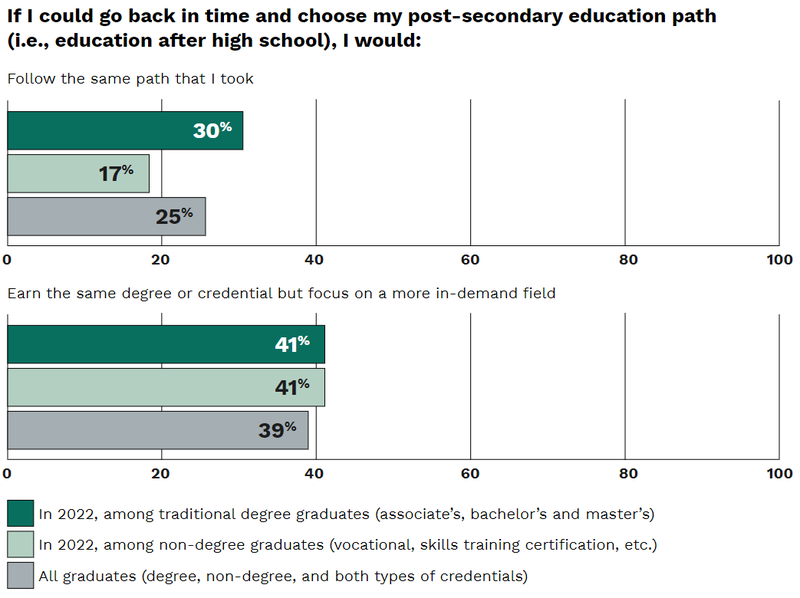At some point, almost every person has come to the conclusion that a degree is a ticket to a better life. The belief is that graduating from university guarantees success, wealth, and the best job possible. Sorry for bursting your bubble, but that's simply not true.
In the real world, outside of campus, you have to work hard and continue learning to achieve success. When you stop learning, you stop improving, and no employer wants such an employee on their team.
The only guarantee a degree can give is a student loan debt
The cost of today’s education has long since crossed the line. The annual growth rate is estimated to be at 7.1%. And what's most crucial is that all your money, time, and effort can’t make you 100% sure about your future. With or without a diploma, you have to go through numerous interviews, push yourself to the limits at work, and continue lifelong learning.
Speaking numbers
According to the 2023 Redballon.work and PublicSquare report, employers do not really consider higher education a privilege. In fact, 70.8% would prefer to hire an experienced candidate without a diploma over a recent graduate.

Even students themselves are no longer sure they’re doing the right thing. According to Cengage Group’s 2022 Graduate Employability Report, 39% of recent graduates would prefer to pursue education in a more in-demand field than they did before.

The most interesting sphere to look at is IT-related job openings. According to a Harvard Business Review post, while the average share of job postings requiring a degree is about 52%, in IT roles, it is just 43%. For example, IBM, one of the largest companies in the industry, requires only 29%, which is the smallest percentage among researched companies.
- 71% of employers prefer experience over education
- 39% of college student would prefer to change their education path
- 48% of job postings do not require a degree
- Only 29% of IBM job postings require some education
Why is it happening?
As we've already mentioned, only 52% of all job openings require education beyond high school. The share is the biggest in healthcare, law, and educational positions. But what about everything else? Do you really need to spend 4 years in college to have a better chance of being noticed?
Real-life work experience now leads the way. Most entry-level jobs, initially aimed at recent grads, require 1 to 3 years of relevant experience. At the same time, some companies do not even recognize internships as relevant. As the numbers above show, education is no longer in demand.
The duration of staying with one company also decreases every year. Now, it’s completely okay to switch jobs every 3 to 5 years. It’s also understandable to change your career path. In such an era, there is no need to have multiple degrees for multiple jobs. You can take courses or switch to a related field.
Moreover, in the fast pace of our changing world, education just doesn’t keep up. The most upsetting thing is that college education often doesn't teach you what you really need. Most classes are theoretical, and the information they provide can probably be found at the local library. What you really need to learn are skills.
Skills like critical thinking, negotiation, and creativity can be mastered through fieldwork and life experience. Of course, it depends on the college and, especially, the professor. Still, you never know what awaits you, right?
- Most entry-level jobs for grads require relevant experience
- Some companies do not recognize internship as relevant experience
- Information they teach you in college can be found at the local library
- Theoretical education can not prepare you to do practical job
There are advantages too
College is not only bad or outdated. It has its points too. There are things that you can learn faster and better through college. For example:
- Self-motivated learning
You won’t be treated the same at school as you will be at college. In higher education, you’ll have much more freedom in what, where, and how you learn. College may help you develop responsibility, which is so important in life.
- Broad network
In many cases, your network can pave the way for you in life. And what better place to start building your network than college? It's a place full of present and future professionals, all related to your field.
- It still may have an impact
Although we’ve said a lot about employers' opinions on education these days, some still find it important and impressive. It's not the fact that you have a diploma in their field — they’ll teach you the necessary things anyway. It's the fact that you made it to the end. About 50% of students drop out during the process, so having a diploma shows that you know how to put effort into what you’re doing.
Looking at all the strong and weak points of education, it’s up to you to decide whether it’s worth it or not. But first, let’s consider alternative options or useful tools to maximize your studying.
So what can you do about it?
It may depend on where you are on your path to a dream job. If you are still enrolled in education or are a recent graduate, consider taking some online courses to learn from. There are plenty of them, and some are even free. Most of these courses offer practical knowledge and skills only. You already know all the theoretical stuff from university, so getting both may be a perfect combo.
If you have the desire and opportunity to start your own business, try it out! Some of the biggest companies we all know today were started by young men and women in their 20s without degrees. Keep in mind, though, that this road is not easier than working for someone else. So, think twice and be prepared before taking the first step.
For those who are still thinking about whether to go to college or not, consider apprenticeships as well. They are much less expensive and offer real hands-on experience. You can earn money while gaining knowledge. In the United States, apprenticeships are commonly linked with trades such as electricians and plumbers. However, there is a wide range of programs available for study.
- Higher education raising question about it usefulness more than ever
- Most online courses offer practical knowledge and skills
- Apprenticeship may become the best choice to have both education and experience
Higher education is now raising questions about how useful it really is. We are not trying to discourage you from pursuing education. The thought we want to convey is that as long as you take your own steps and not just float down the river, you will find the right way. Everything is up to you!
